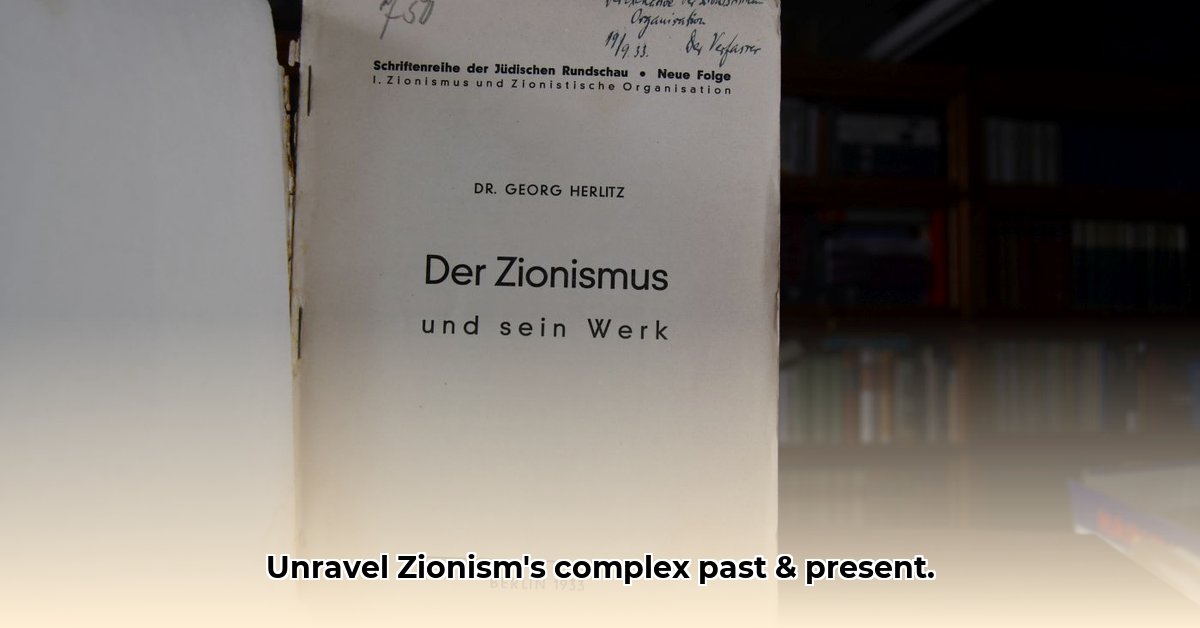
Right, so let's chat about Zionism. It's a complex topic with a long and often misunderstood history. This article aims to provide a clear, balanced overview, exploring its origins, evolution, and the diverse interpretations that exist today. We'll avoid the usual shouting matches and stick to the facts, acknowledging the different perspectives that exist.
Zionism: From Early Dreams to Modern Debates
The late 19th and early 20th centuries weren't easy for Jewish people in Europe. Widespread antisemitism and lack of security fueled a desire for a safe haven, a place to call home. This yearning found its expression in Zionism, a nationalist movement advocating for a Jewish state in Palestine. Theodor Herzl, often considered the father of modern political Zionism, articulated this vision, emphasizing self-determination and the establishment of a sovereign Jewish nation. Wasn't just about religion; it was about creating a secure future free from persecution. But what did this mean in practice, and how has Zionism evolved over time?
The Balfour Declaration: A Promise and its Unintended Consequences
A pivotal moment was the 1917 Balfour Declaration, in which the British government expressed support for a "national home for the Jewish people" in Palestine. The declaration's ambiguity, however, has been a source of ongoing contention. While it provided a significant boost to Zionist aspirations, its imprecise wording and its implications for the existing Arab population laid the groundwork for future conflicts. The subsequent influx of Jewish immigrants into Palestine exacerbated tensions, setting the stage for the complex realities we see unfolding even today. Why was this declaration so problematic, despite its intentions? It failed to address the pre-existing population and their future.
The Holocaust and the Birth of Israel: A Turning Point
The horrors of the Holocaust further intensified the urgency for a Jewish state. The creation of Israel in 1948 was a momentous event, celebrated as a triumph by many, while simultaneously marking a profound tragedy for the Palestinian population who were displaced as a result. This event, while celebrated by many, remains undeniably tied to the displacement of Palestinians, a fact which cannot be ignored when discussing the complexities of Zionism. This event remains highly sensitive and continues to shape present-day geopolitics. How can we understand these contradictory realities? By engaging with the voices of both Israelis and Palestinians.
Modern Zionism: A Spectrum of Opinions
Today, Zionism encompasses a wide spectrum of viewpoints. Some see it simply as support for Israel's existence, irrespective of its policies. Others view it as a movement requiring constant adaptation to address ethical concerns and advocate for a more just society, both for Israelis and Palestinians. Some advocate for peaceful coexistence and negotiation, while others favour a more expansionist approach to the nation. This diversity of perspectives makes a singular definition of Zionism challenging. What are some of the key distinctions within modern Zionist thought? The degree to which Israel can and should compromise on its security and territorial ambitions plays a key part in these disagreements.
Anti-Zionism: A Complex and Contentious Term
The term "anti-Zionism" itself is a major point of contention. Some view it as legitimate criticism of Israeli government policies, while others equate it with antisemitism, claiming that any opposition undermines Israel's right to exist. This is a crucial distinction: criticising a government is not the same as hating a people. However, the line between these positions can become blurred, making the conversation even more fraught. How can we avoid this confusion? By focussing on specific criticisms of Israeli policies rather than making generalized attacks.
Understanding the Nuances
Comprehending Zionism requires navigating a complex tapestry of narratives, perspectives, and deeply held beliefs. It's not a simple story with clear heroes and villains. It's a journey of evolving ideas, where the interpretations of events and actions vary greatly. It’s crucial to approach the subject with openmindedness and an acknowledgement of those different perspectives. This continued dialogue and debate is crucial to achieving a more nuanced understanding. What are some key areas of ongoing debate? The differing interpretations of the Balfour Declaration, the events of 1948, and the ongoing occupation of Palestinian territories are among them.
Key Insights:
- Zionism's origins lie in the desire for a safe haven for Jewish people in the face of historical persecution.
- The Balfour Declaration, while supporting a Jewish homeland, lacked clarity, leading to ongoing conflict.
- The creation of Israel in 1948 sparked lasting controversy and displacement.
- Modern Zionism embodies a range of diverse viewpoints.
- The line between legitimate criticism of Israeli policy and antisemitism remains a key source of debate.
Through understanding these complexities, we can contribute to a more informed and nuanced discussion about a movement as important as Zionism, ensuring that both the historical context and the current debates are properly understood and engaged with.